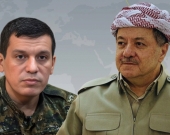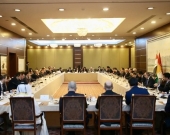Six powers clinch breakthrough deal curbing Iran's nuclear activity

(Reuters) - Iran and six world powers clinched a deal on Sunday curbing the Iranian nuclear program in exchange for initial sanctions relief, signaling the start of a game-changing rapprochement that would reduce the risk of a wider Middle East war.
Aimed at easing a long festering standoff, the interim pact between Iran and the United States, France, Germany, Britain, China and Russia won the critical endorsement of Iranian clerical Supreme Leader Ayatollah Ali Khamenei.
U.S. President Barack Obama said the deal struck after marathon, tortuous and politically charged negotiations cut off Tehran's possible routes to a nuclear bomb. But Israel, Iran's arch-enemy, denounced the agreement as an "historic mistake".
Halting Iran's most sensitive nuclear activity, its higher-grade enrichment of uranium, it was tailored as a package of confidence-building steps towards reducing decades of tension and ultimately creating a more stable, secure Middle East.
Indeed, the United States held previously undisclosed, separate direct talks with Iran in recent months to encourage diplomacy towards a nuclear deal, a senior U.S. official said.
Washington and Tehran have lacked diplomatic relations and been locked in hostility since Iran's 1979 Islamic Revolution. Any new detente between the two will be opposed by Washington's Israeli and conservative Gulf Arab allies as it could tilt the regional balance of power towards Tehran.
European Union foreign policy chief Catherine Ashton, who has been coordinating diplomatic contacts with Iran on behalf of the major powers, said the accord created time and space for follow-up talks on a comprehensive solution to the dispute.
"This is only a first step," said Iranian Foreign Minister and chief negotiator Mohammad Javad Zarif. "We need to start moving in the direction of restoring confidence, a direction which we have managed to move against in the past."
Downtrodden by sanctions, many Iranians expressed joy at the breakthrough and prospect of economic improvement. Iran's rial currency, decimated earlier this year due to sanctions, jumped more than 3 percent on news of the deal on Sunday.
Obama said that if Iran did not meet its commitments during the six-month period covered by the interim deal, Washington would turn off the tap of sanctions relief and "ratchet up the pressure".
"There are substantial limitations which will help prevent Iran from building a nuclear weapon," he said in a late-night appearance at the White House after the deal was sealed. "Simply put, they cut off Iran's most likely paths to a bomb."
But Israeli Prime Minister Benjamin Netanyahu condemned the deal as it left the nuclear fuel-producing infrastructure of its arch-foe intact. "What was achieved last night in Geneva is not a historic agreement, it was a historic mistake," he said.
"Today the world has become a much more dangerous place because the most dangerous regime in the world took a significant step towards obtaining the world's most dangerous weapon," he said in public remarks to his cabinet.
He reiterated a long-standing Israeli threat of possible military action against Iran - even as a member of his security cabinet conceded that the interim accord limited this option.
U.S. Secretary of State John Kerry sought on Sunday to reassure Israel, saying Iran's bomb-making potential had been restricted and its atomic program would be more transparent.
"I believe Israel in fact will be safer, providing we make sure that these ... sanctions don't get lifted in a way that reduces the pressure on Iran - and we don't believe they will be, there's very little sanctions relief here - that the basic architecture of the sanctions stays in place," he told CNN.
RELIEF, ELATION IN GENEVA
Some analysts pointed out the risk of hardliners in Iran - elite Revolutionary Guards who see any opening to the West as dangerous - and in the U.S. Congress, which could enact harsher sanctions - acting to scuttle the breakthrough.
But big power foreign ministers seemed relieved and elated after Ashton read out a statement proclaiming the deal in the middle of the night at the United Nations office in Geneva.
Ashton and Kerry U.S. Secretary of State John Kerry hugged each other. Kerry and Russian counterpart Sergei Lavrov shook hands. Minutes later, as Iran's delegation posed for photos, Zarif and French Foreign Minister Laurent Fabius embraced. France had taken the hardest line on Iran in recent talks.
The West has long suspected that Iran has been seeking covertly to develop a nuclear weapons capability. The Islamic Republic, a major oil producer, denies that, saying its nuclear program is a peaceful quest for an alternative source of electricity to serve a rapidly expanding population.
The United States said the deal halts advances in Iran's nuclear program, including construction of the Arak heavy-water reactor that deeply worries the West as it could yield plutonium, another atomic bomb ingredient, once operational.
The accord would neutralize Iran's stockpile of uranium enriched to a fissile purity of 20 percent, a higher-level stage nearing the threshold needed for a bomb, and mandates more frequent U.N. nuclear inspections, U.S. officials said.
A U.S. fact sheet said Iran had also committed to suspending enrichment above a concentration of 5 percent - the level suitable for running nuclear power stations, which is Iran's stated purpose. Refined uranium provides the core of an nuclear warhead if refined to a high degree.
In return, Iran could obtain access to $1.5 billion in revenue from trade in gold and precious metals and the suspension of some sanctions on its automotive sector, and see its petrochemical exports revive.
LIMITED, REVERSIBLE SANCTIONS RELIEF
But the agreement, while freezing U.S. plans for deeper cuts to Iranian oil exports, will not allow any extra Iranian oil into the market or let Western energy investors into the country, U.S. officials said.
Iranian oil exports will remain for now at currently markedly reduced levels. "$4.2 billion from these sales will be allowed to be transferred in installments if, and as, Iran fulfils its commitments," the White House fact sheet said.
Much of the sanctions infrastructure, anchored by a Western embargo on Iranian crude oil and a ban on Iranian use of the international banking system, would remain in place pending a final deal aimed at removing all risk of an Iranian atom bomb.
"The approximately $7 billion in relief is a fraction of the costs that Iran will continue to incur during this first phase under the sanctions that will remain in place," the White House said. "The vast majority of Iran's approximately $100 billion in foreign exchange holdings are inaccessible or restricted."
Relief from sanctions is to begin in two to three weeks, Iran's Mehr news agency quoted Zarif as saying.
"Important and encouraging first stage agreement with Iran. This ... shows it is possible to work with Iran, and through diplomacy address intractable problems," British Foreign Secretary William Hague said via his Twitter account.
Russian President Vladimir Putin called the result a victory for all and said the sides should seek a long-term solution guaranteeing Iran's right to a peaceful nuclear energy program and security of all in the region including Israel.
"It is only the first step in a long and uneasy path ... (But) the principle of step-by-step (movement) and reciprocity have found reflection in the approved document which has won ... global recognition," Putin said in an email to Reuters.
Leaders of the Islamic Republic welcomed the accord.
"This can be the basis for further intelligent actions. Without a doubt the grace of God and the prayers of the Iranian nation were a factor in this success," Khamenei, a veteran hardliner with the ultimate power in Iran, said in a letter to President Hassan Rouhani published by state news agency IRNA.
Rouhani, a moderate elected by a landslide in June promising "constructive engagement" with the world and relief from sanctions, said the "outcome of these negotiations is that the ... world powers have recognized Iran's nuclear rights".
Rouhani's attempts to repair diplomatic bridges broken by his bellicose predecessor Mahmoud Ahmadinejad and his success in winning the backing of Khamenei reignited negotiations which had dragged on inconclusively, with the two sides talks reciting irreconcilable positions to each other, for 10 years.
PITFALLS TO IMPLEMENTING DEAL
"Ultimately, it is the Iranian people and the American people who deserve the most credit. Both are responsible for this initial victory by rejecting defeatists who said that a brighter future was not possible (and) diplomacy could not succeed," said Trita Parsi, president of the National Iranian American Council (NIAC) think-tank.
But many obstacles remain, he cautioned. "Hardliners in both countries will work harder than ever to sabotage this pivot towards a diplomatic path. Those whose only currency is confrontation will search for any opportunities they can find to undermine and sabotage this interim deal."
For now though, many Iranians were joyful. A post in Farsi by Zarif announcing the deal on his Facebook page received 47,979 "likes" in two hours. There was an outpouring of gratitude and many described him as a "national hero".
"I am writing this comment with my eyes filled with tears. Thank you for everything ... After many years, you have returned happiness to the people. You have restored hope in our hearts and pride in my country," commented Mehrnoosh Mohebi.
(Additional reporting by Stephanie Nebehay, Fredrik Dahl, John Irish, Arshad Mohammed, Louis Charbonneau in Geneva, Alexei Anischuk and Katya Golubkova in Moscow, Isabel Coles, Jon Hemming and Yara Bayoumy in Dubai, Caren Bohen and Will Dunham in Washington, Dan Williams and Jeffrey Heller in Jerusalem; Editing by Mark Heinrich)












